Have a Question?
Incident Management System
Kosover Group Pty Ltd Trading as PotentialMe has implemented an Incident Management System to support the delivery of services and to ensure that we adhere to a high level of professionalism, to provide a high quality of service and to ensure that any incident is acknowledged, responded to, well managed and learned from.
This incident management system has been set up with procedural fairness for identifying, assessing, managing, and resolving incidents.
This incident management system and its procedures are to be reviewed Annually.
The procedures set out in this incident management system aim to address such things as:
- The people to whom incidents must be reported.
- How people with disability affected by an incident will be supported and involved in resolving the incident.
- When corrective action is required.
PotentialMe will keep records about incidents and will also document these in an Incident Report Register which will be available in conjunction with our Incident Management System. For details as to Information to be collected and entered into the Incident Report Register – please see page 4 of this document.
Copies of this system will be made available to all workers involved or that represent PotentialMe.
Copies of this system are to also be provided to:
- Persons with disability receiving supports or services from PotentialMe;
- Each PotentialMe representative, worker or anyone otherwise engaged by PotentialMe;
- The family members, carers, independent advocates and significant others of persons with disability receiving supports or services from PotentialMe;
And PotentialMe representatives are to assist persons referred to above to understand how this system operates.
The Incident Report Register detailing each Incident (including alleged Incidents) will include:
- Date and time of incident
- Date on Incident Form/ Report
- Location of incident
- Details of the incident
- Description
- The impact on or harm caused to, any person with disability
- Note as to whether the incident is reportable (if known)
- Name/s of others involved and role
- Witnesses to the incident
- Name & contact details of the person making the record of the (alleged) incident
- Initial response
- PotentialMe Representative’s initial response to the person making the allegation, the impacted person and who is the subject of the allegation.
- This must include actions taken to support or assist persons with disability affected by the incident
- Date and time of reporting to Principal
- Reporting to other bodies
- Note whether the need to notify the Police was considered about a suspected criminal offence or any other governing body
- Note whether the incident is a reportable incident
- Assessment and Investigation
- Details of Assessment undertaken and investigation (where undertaken)
- Risk
- Initial risk assessment following identification of the incident or receipt of the allegation, including identified risks, arrangements for managing those risks, and decisions made about the worker and the action taken in relation to the person with disability person with disability or worker (e.g. change in duties, support or counselling)
- Consultation (any consultations undertaken with the impacted person and note all related)
- Statistical and other information
- Statistical and other information that will allow us to review issues raised by occurrence of incidents, identify and address systemic issues, and report information relating to complaints to the Commissioner (if requested to do so)
- Follow up actions
- including whether persons with disability affected by the incident have been provided with any reports or findings regarding the (alleged) incident
Types of incidents covered by this system
1. Acts, omissions, events or circumstances that occur in connection with providing NDIS supports or services to a person with disability and have, or could have, caused harm to the person with disability
The subject of the allegation for these incidents may be anyone, including one of our workers, or a member of the general public, as long as the incident occurred in connection with the provision of NDIS supports and services to the impacted person with disability.
Harm is the resulting impact of the act, omission, event or circumstance that occurs, and can include physical, emotional or psychological impacts such as physical injuries, emotional impacts such as fear or poor self-esteem, and psychological impacts such as depression or impacts on a person’s learning and development.
2. Acts by a person with disability that occur in connection with providing NDIS supports or services to the person with disability and which have caused serious harm, or a risk of serious harm, to another person.
Serious harm means that the harm is not minor or trivial. It involves a substantial physical, emotional or psychological impact on the impacted person such as a serious injury, or serious emotional or psychological distress.
Incidents that result in injuries to workers or others that do not consist of the act of a person with disability in connection with the provision of supports and services to the person with disability, do not need to be recorded in this incident management system.
3. Reportable incidents that have or are alleged to have occurred in connection with providing NDIS supports or services to a person with disability
Reportable incidents must be reported to the NDIS Commission. For an incident to become a reportable incident it must satisfy the following two requirements:
1. The incident must be defined as a reportable incident in section 73Z(4) of the Act and section 16 of the NDIS (Incident Management and Reportable Incidents)Rules 2018 NDIS Quality and Safeguards Commission 14.
Subsection 73Z(4) of the NDIS Act states that reportable incident means:
- the death of a person with disability;
- serious injury of a person with disability;
- abuse or neglect of a person with disability;
- unlawful sexual or physical contact with, or assault of, a person with disability;
- sexual misconduct committed against, or in the presence of, a person with disability, including grooming of the person for sexual activity;
- the use of a restrictive practice in relation to a person with disability, other than where the use is in accordance with an authorisation (however described) of a State or Territory in relation to the person.
This above list must be read with section 16 of the Rules, which says that:
- unlawful physical contact with a person with disability is not a reportable incident if the contact with, and impact on, the person with disability is negligible
- the use of a restrictive practice in relation to a person with disability where the use is not in accordance with an authorisation (however described) of a State or Territory is not a reportable incident if the use is in accordance with a behaviour support plan for the person and the State or Territory in which the practice is used does not have an authorisation process in relation to the use of the practice, and
- the use of a restrictive practice in relation to a person with disability where the use is in accordance with an authorisation (however described) of a State or Territory is a reportable incident if the use is not in accordance with a behaviour support plan for the person
The definition of reportable incident captures not only incidents that have occurred, but also allegations of the incidents described above. It also only includes incidents where the impacted person is a person with disability – incidents that are recorded in the incident management system that relate to serious harm to workers or other people committed by a person with disability are not reportable. The only exception to this is where a person with disability is the impacted person of the incident.
2. The incident must have occurred or be alleged to have occurred in connection with the provision of supports or services we are providing
Procedures Fairness
This incident management system requires that people are afforded procedural fairness when an incident is dealt with by PotentialMe.
Procedural Fairness’ refers to people being given an opportunity to defend themselves and raise any other mitigating circumstances before a disciplinary or performance decision is reached.
In order to appropriately practice Procedural Fairness, the following steps must be taken before any disciplinary action is taken:
- Advise the person of the allegation/s made against them or the issues to be dealt with;
- Provide the person with a reasonable time period to respond
- Consider the person’s response before making a decision and conduct reasonable and thorough enquiries; and finally
- Make a decision on suitable disciplinary action based on all of the information collected
How Incidents are Identified/ Identification of Incidents
Incidents may be identified in a number of ways, including where a worker or another person observes the incident, a person with disability makes a disclosure about the incident, or another party informs you that the incident occurred.
This incident management system outlines what expectations we have of a worker’s response when incidents occur.
PotentialMe promotes a culture where workers feel comfortable to identify incidents when they occur, report incidents to their relevant personnel, and record these incidents in the incident management system.
A culture supportive of incident identification helps ensure that we are aware of all incidents that occur and are working towards continuous improvement in the safety of supports and services to people with disability.
Some incidents will be simple to identify, as a worker may witness the incident, or a person with disability may make a disclosure that can be recorded. However, other incidents may be harder to identify, especially where they involve abuse, neglect, or other types of reportable incidents.
In addition to incidents or allegations of incidents that are disclosed by an impacted person, or witnessed by someone, there are also additional signs that may indicate someone is an impacted person. These are indicators of potential incidents, especially where they involve abuse, neglect, sexual misconduct, or unauthorised use of restrictive practices.
The Table on the next page is an extract from NDIS Commission Website and details some Incident Types and corresponding Behavioural indicators and physical signs that can often be attributed to these Incident Types. Please note these are only examples and not an exhaustive list.
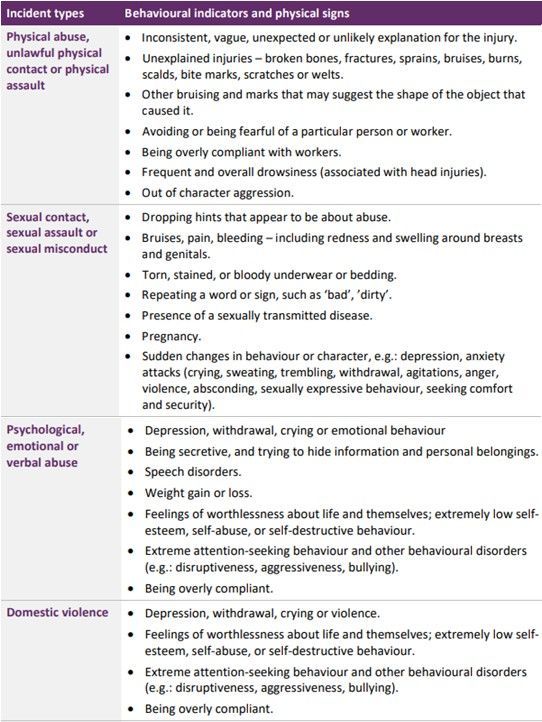
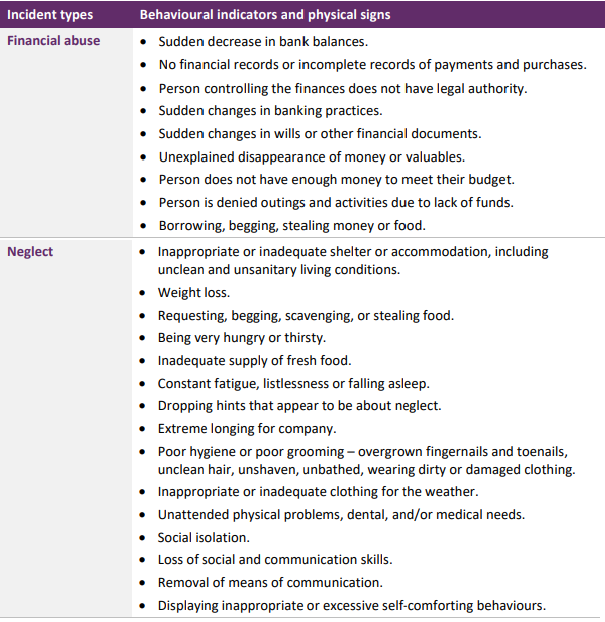
How Incidents are Identified/ Identification of Incidents
PotentialMe will keep records to improve accountability, promote transparent decision making and ensure best practice.
The storage of information and records is a critical part of our incident management process.
The information regarding incidents are recorded and securely stored both by way of hardcopy and soft copy.
A hard copy will be stored in the Directors’ home office and a soft copy kept in the Directors’ password protected computer. All incident records are kept this way.
PotentialMe Principal OT Sarah Kosover is responsible for collecting information regarding the circumstances of an incident. Where a worker is witness to the incident, they are to report directly to our Principal OT and complete an Incident Report which will then be recorded in the PotentialMe Incident Report Register.
PotentialMe incident management system is to collect a range of information about each incident that occurs, including any Reportable Incidents. Information to be collected when an Incident occurs is outlined in the table on the next page(extract from NDIS Commission Website).
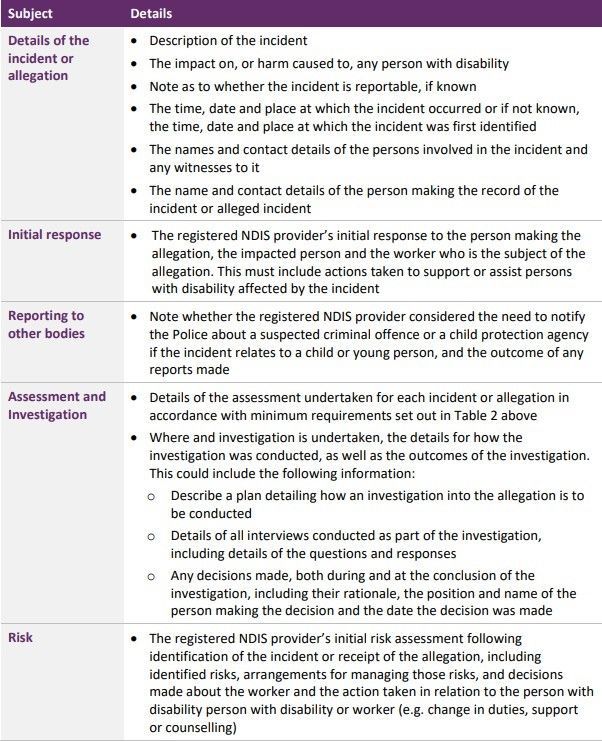
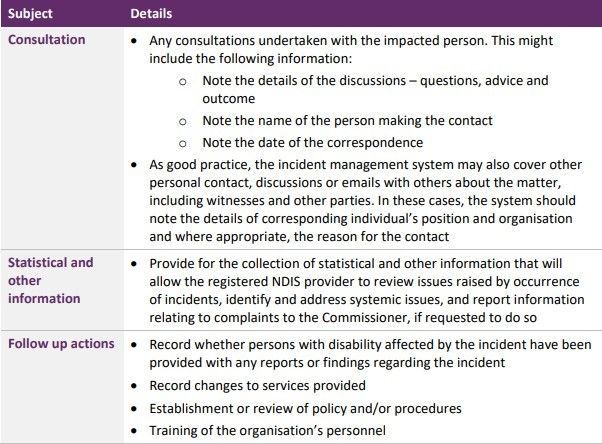
As previously mentioned, this information is to be securely stored both by way of hard copy and soft copy and is to be kept for a minimum of 7 years from the date the record is made. In addition:
- Records relating to the worker who is the subject of the allegation is to be kept on a file that is separate to their personnel file, to ensure no privacy or confidentiality requirements are breached
- Information, relating to the assessment, or investigation if one is conducted, that is pertinent to supporting a person with disability (including where they are the impacted person, or the subject of the allegation) or management of the worker, is to be copied to their respective personnel or participant files for future reference
- All files relating to a specific incident is to be kept together to ensure all information relating to a reportable incident is readily accessible
- Access to records is limited to appropriate workers who have a business purpose for doing so e.g. accessing information that is directly related to the provision of person with disability care.
Correspondence relating to the assessment, or potential investigation, of an incident should also be documented and retained.
This includes:
- For correspondence between any representative of PotentialMe, the person with disability or their family:
- All correspondence following any incident should be retained
- Any statements made by the impacted person to deny or correct remarks, statements or claims should be recorded
- Date all statements and enter the dates mailed or delivered to the person with disability.
- If there has been a reply from the person with disability or their representative, attach to the record and date
- If there is no reply or response from the person with disability, this should also be recorded
- For correspondence from the subject of the allegation following the incident:
- All correspondence should be retained
- Any statements made by the subject of the allegation to deny or correct remarks, statements or claims made by the impacted person should be recorded
- Date all statements
- For records of correspondence between any representative of PotentialMe, the person with disability or advocates
- Meetings between a registered NDIS provider and person with disability should be recorded with the date, items discussed and names of those present
- Paper and electronic correspondence should be dated and copies filed
- Oral discussion notes, including telephone discussions (date, time, people involved)should be dated and filed
How incidents are reported/ Reporting Incidents
It is PotentialMe policy and is regularly communicated that workers and all representatives of the organization are supported to report incidents and that there are no negative consequences for doing so.
PotentialMe have a policy for worker disclosure.
All workers are advised that they can make a complaint on behalf of a person with disability to our Principal OT or to the NDIS Commission.
All workers and all representatives of the organization are to comply with this incident management system and hence, be aware of their roles and responsibilities in identifying, managing and resolving incidents and in preventing incidents from reoccurring.
Assessment of incident
When it is identified or disclosed that an allegation or incident has occurred, and steps have been taken to ensure the safety of people with disability, we must undertake an assessment to determine:
- Why the incident occurred
- Whether the incident could have been prevented
- How well the incident was managed and resolved
- What, if any, regulatory action needs to be undertaken to prevent further similar incidents from occurring, or to minimise their impact
- Whether other persons or bodies need to be notified of the incident
A post-incident assessment is a requirement of this incident management system and is to be undertaken for all incidents, including for reportable incidents. It is a further requirement of this policy to support relevant personnel to undertake these assessments when incidents occur.
A detailed assessment of the cause of the incident, its effect on the person with disability and any operational issues that may have contributed to occurrence, forms an integral part of this incident management system.
If we cannot establish these factors in our assessment, further investigation is required for any incident
In the case of reportable incidents, we
- may opt to undertake an investigation
- may be directed by the NDIS Commission to undertake an internal investigation; or,
- engage an external party to undertake an investigation.
Notifying the NDIS Commission of Reportable Incidents
If any representative of PotentialMe becomes aware of a possible reportable incident that has occurred, or is alleged to have occurred, in connection with the provision of supports or services by PotentialMe, they have a duty to notify one of the following as soon as possible:
- PotentialMe Principal OT, Sarah Kosover and/ or
- PotentialMe Director, Igor (Gary) Kosover
Only one of Sarah Kosover (Principal OT) or Igor (Gary) Kosover (Director) is to notify the NDIS Commission of a reportable incident and they are responsible for identifying whether the incident is a reportable incident that occurred in connection with the provision of supports or services and, if it is, taking all reasonable steps to ensure that it is notified to the NDIS Commission
If an incident is deemed to be a reportable incident, it must be notified to the NDIS Commission by one of Sarah Kosover (Principal OT) or Igor (Gary) Kosover (Director)using the approved forms that are available on the NDIS Commission Portal.
There are set timeframes for notification and providing further information. These timeframes are critical to ensuring an incident is effectively managed.
All reportable incidents, except for the unauthorised use of a restrictive practice, must be notified to the NDIS Commission within 24 hours of becoming aware of the incident.
Any unauthorised use of restrictive practices must be notified within 5 days.
PotentialMe policy only requires notifying the NDIS Commission of reportable incidents that occur in connection with the service we are providing.
If a representative of PotentialMe witnesses an incident or conduct, by another registered provider, that is reportable, this should be raised as a concern to the NDIS Commission.
This should only happen when:
- A representative of PotentialMe witness or become aware of an incident that is not in connection with the services we ourselves are providing; and,
- The representative of PotentialMe believes the registered NDIS provider linked to the incident hasn’t notified the NDIS Commission.
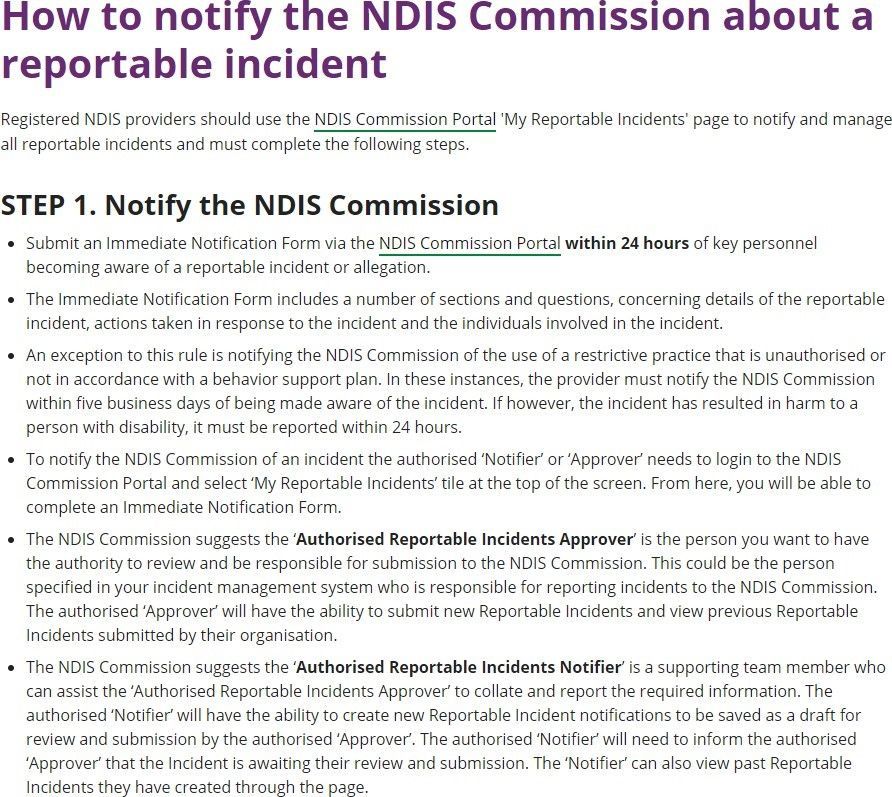
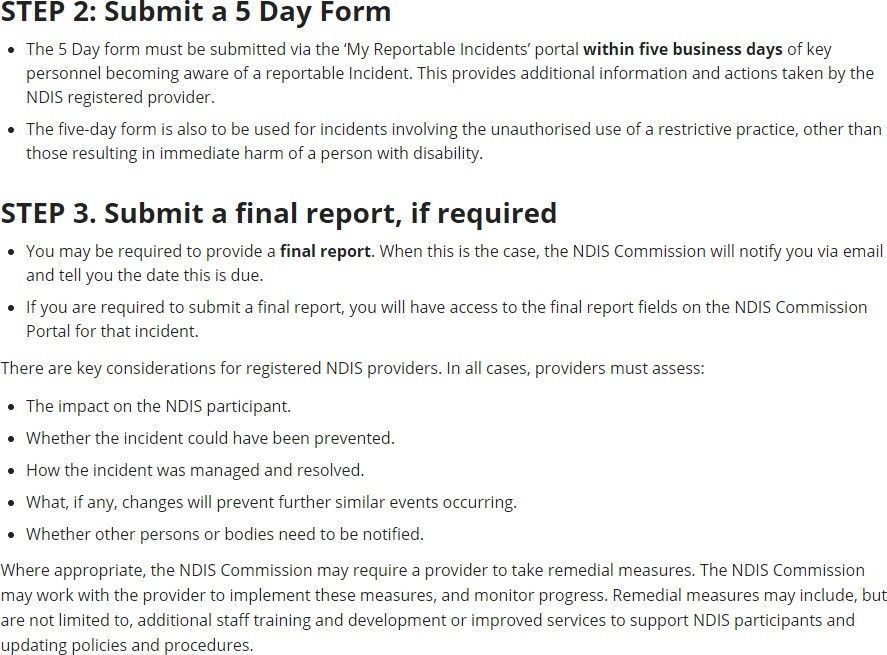
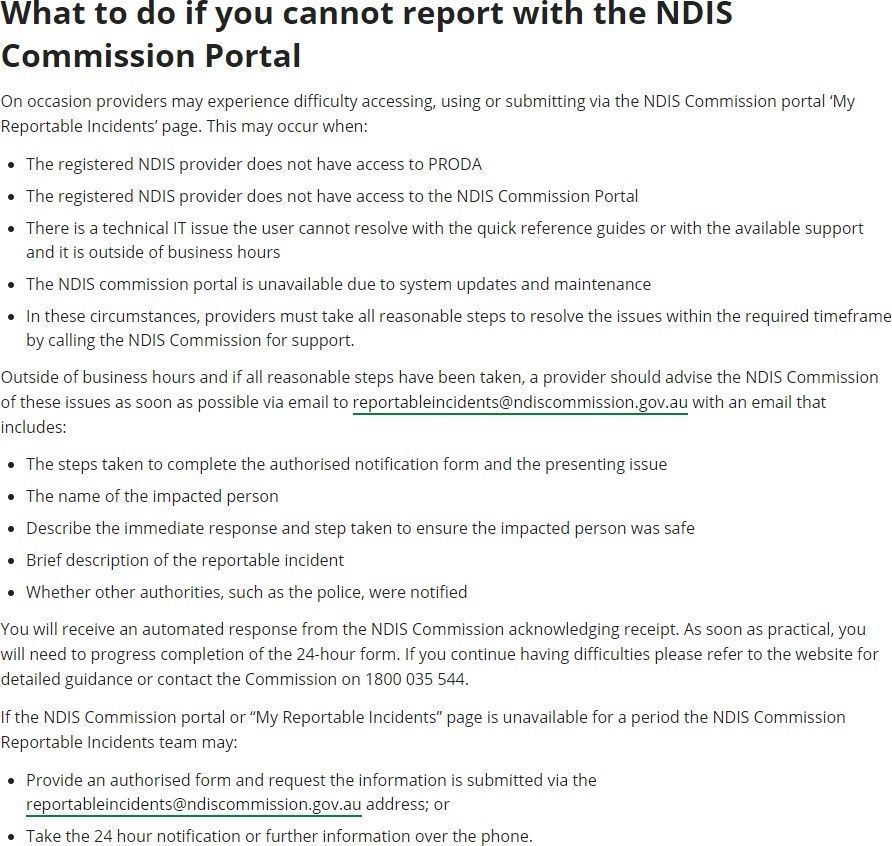
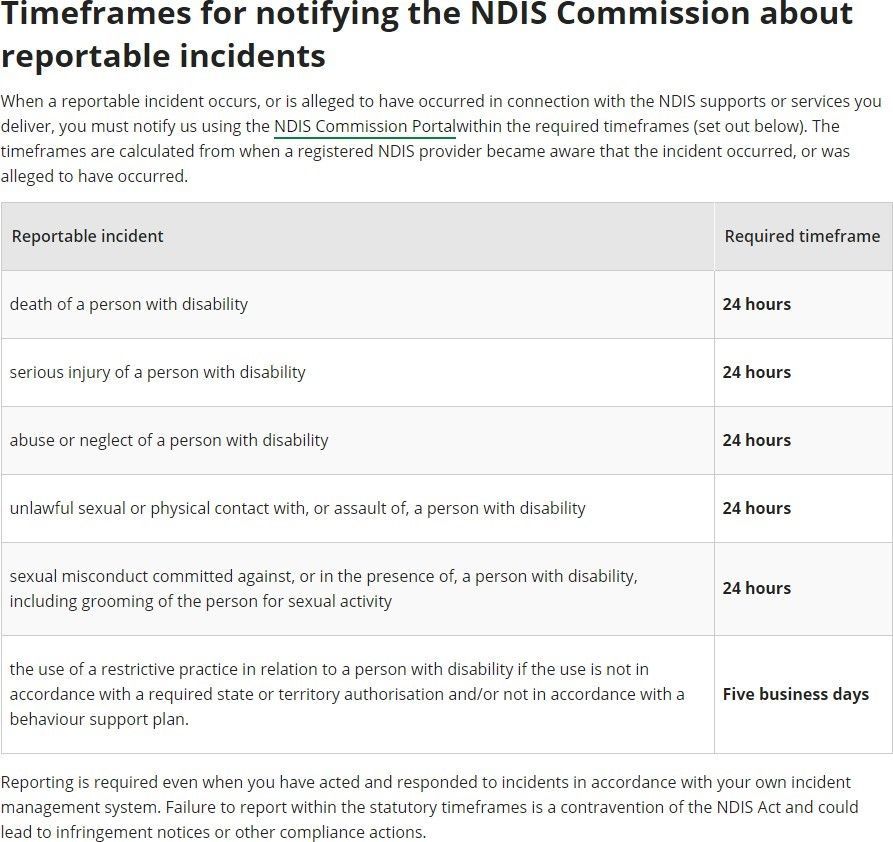
Circumstances in which certain information relating to reportable incidents need not be obtained or notified
PotentialMe is not required to obtain, or notify the Commissioner of, the following information
- Reportable incidents that would otherwise be required to notified to the Commissioner within 24 hours:
- a description of the reportable incident;
- except where the reportable incident is: the death of a person with disability; or the serious injury of a person with disability; or the abuse or neglect of a person with disability; or the unlawful sexual or physical contact with, or assault of, a person with disability; or sexual misconduct committed against, or in the presence of, a person with disability, including grooming of the person for sexual activity;
- a description of the impact on, or harm caused to, the person with disability;
- if known - the time, date and place at which the reportable incident occurred;
- the names and contact details of the persons involved in the reportable incident;
- Incidents that would otherwise be required to notified to the Commissioner within 5days:
- the names and contact details of any witnesses to the reportable incident;
- Other Reportable incidents that would otherwise be required to notified to the Commissioner within 5 days:
- a description of the reportable incident, including the impact on, or harm caused to, the person with disability;
- if known—the time, date and place at which the reportable incident occurred;
- the names and contact details of the persons involved in the reportable incident;
- the names and contact details of any witnesses to the reportable incident;
If obtaining the information listed above would, or could reasonably be expected to: (a) prejudice the conduct of a criminal investigation; or (b) expose a person with disability to a risk of harm.
Keeping the Commissioner updated
There are certain circumstances where PotentialMe would need to keep the Commissioner updated:
This applies if:
- PotentialMe gives notification of a reportable incident at a particular time; and
- PotentialMe becomes aware of significant new information in relation to the incident after that time; and
- the significant new information:
- is or relates to a change in the kind of reportable incident; or
- is a further reportable incident.
PotentialMe must notify the Commissioner of the significant new information as soon as reasonably practicable after becoming aware of the information.
The notification must be given in writing.
If notification is given under this section of a further reportable incident, PotentialMe is taken to have complied with meeting the requirements that certain reportable incidents must be notified to the Commissioner within 24 hours & other reportable incidents that must be notified to the Commissioner within 5 business days (as the case requires).
The Commissioner may approve a form for the purposes of giving notifications in writing under this section.
Providing support and assistance to the impacted person of an incident
When an incident occurs – irrespective of whether it is reportable or not – we must take action to ensure the safety and wellbeing of people involved in the incident (including people with disability, and workers and other people where the incident involves an act by a person with disability).
If any person involved in the incident suffers a serious injury and requires medical treatment, any representative of PotentialMe who is present must immediately contact the appropriate emergency services.
PotentialMe Response Plan
It is good practice to have a response plan for when incidents occur, this is to ensure the health, safety and wellbeing of people with disability.
All actions should be undertaken with compassion first and foremost and then with an offer of support and care.
- Actions to be taken immediately after an incident:
- If any person involved in the incident suffers a serious injury and requires medical treatment: immediately contact the appropriate emergency services.
- Once contacted the appropriate emergency service, please immediately notify one of Sarah Kosover (Principal OT) or Igor (Gary) Kosover (Director)
- Where the incident is or may be a reportable incident, please refer to ‘Notifying the NDIS Commission of Reportable Incidents’ section of this Incident Management System.
- Assessment and mitigation of any immediate risks to other people with disability that could be impacted by the incident
- To achieve this successfully, it is imperative to first understand the nature of the Incident and its cause.
- Once the cause has been identified, steps are to be taken to mitigate the risk of the incident occurring again.
- If unsure what steps to take, please contact one of Sarah Kosover (Principal OT) or Igor (Gary) Kosover (Director)
Where it is alleged or suspected that a criminal offence has occurred, or where there is ongoing danger, PotentialMe representative should contact the Police and other relevant emergency services.
To ensure safety immediately after an alleged or suspected criminal conduct toward a person with disability, or where there is ongoing danger the PotentialMe representative should:
- Ensure the impacted person is safe from harm
- Contact Police if there is a risk of immediate harm which requires their assistance
- Contact the ambulance if someone is injured
- Notify one of Sarah Kosover (Principal OT) or Igor (Gary) Kosover (Director)
An impacted person may decide not to participate in a victim interview or provide a witness statement regarding the alleged offence, and it is our policy to respect the impacted person’s decisions.
How the impacted person will be involved in the management and resolution of the incident
PotentialMe encourages the involvement of impacted persons in the management and resolution of incidents taken place but only if the impacted persons wish to participate.
The extent of the involvement of impacted person will also depend on their willingness to participate.
Even if the impacted person chooses not to be involved, they will be kept abreast of the investigation, assessment and will be notified of corrective action taken.
Investigations
All incidents should be investigated. The purpose of an investigation is to establish the causes of a particular incident, its effect on the impacted person, and any operational issues that may have contributed to the incident occurring.
After each incident, either Sarah Kosover (Principal OT) or Igor (Gary) Kosover (Director) will be nominated to manage and oversee the investigation i.e. be nominated the Investigator(please refer to below for the role of the investigator).
During the investigation, an analysis should be carried out to identify any PotentialMe System failures.
An investigation will include the following steps:
- Establishing the cause of the incident
- Determining its impact
- Identifying operational issues that may have contributed to its occurrence including:
- Is there a procedure, which covers this area of operation?
- Is the procedure adequate? (I.e. effective, workable, comprehensive, simple, easy to use, etc.)
- Was the procedure properly implemented?
- Was the procedure followed?
Depending on the incident, a Corrective Action Note should be raised. The scope and impact of the corrective action taken should be appropriate to the magnitude and potential for harm of the incident
The role of the Investigator
An investigation is to be conducted internally
Where the required expertise within our organisation, or where there is a conflict of interest present, it is PotentialMe policy to involve other external organisations to undertake the investigation – this also may be required at the instruction of the NDIS Commission. It is important for the appointed investigator to be impartial and objective, and maintain independence throughout the investigation (see Maintaining Independence below).
The investigator will have appropriate decision-making authority and overall responsibility for coordinating and directing the investigation.
The investigator must be appropriately trained and have the experience required for conducting incident investigations. The investigator is responsible for overseeing the investigation process, and gathering the relevant evidence and facts to ensure that there is an in-depth understanding of the incident. The investigator may recommend seeking internal or external experts to advise on matters relating to the investigation.
It is policy to ensure that the appointed investigator is objective and impartial to the incident and investigation.
To maintain independence, the investigator should have had no involvement in the incident and could be:
- Someone from a different part of your organisation
- Someone from another registered NDIS provider
- An external party with the skills and experience to conduct the investigation.
To ensure that investigations are fair, it is very important to manage any actual or perceived conflict of interest in relation to the incident investigation.
A conflict of interest refers to a situation where the personal or professional interests of an investigator could influence the performance of their official duties or responsibilities in the investigation.
A conflict of interest can be actual or perceived. An actual conflict of interest relates to any personal, professional or financial interest that may compromise the investigator’s objectivity and impartiality. A perceived conflict of interest occurs where it could reasonably be perceived, or appears, that a competing interest could influence the investigator’s decisions.
When corrective action is required and the nature of that action
Our incident management system provides a tool that can be learnt from and will assist to identify patterns of behaviour or systemic issues that can be continuously improved in providing support to people with disability.
Whether Corrective action should be undertaken in response to an incident is dependent on the nature of Incident.
For example, Corrective action is expected in the following circumstances:
- Where an incident may have been prevented (or the severity lessened) by some action (or inaction)
- Where there is an ongoing risk to people with disability
- Where action may prevent or minimise the risk of a reoccurrence
Like complaints and other feedback, incidents provide an opportunity to review practices and procedures and identify where improvements in service quality and safety can be made. Assessment or investigation of an incident must consider the range of issues listed under Assessment of incidents on page 14 of this policy, as well as:
- The views of people with disability impacted by the incident
- What we have learnt and could improve on
It is an expectation to consider the outcome of such assessments and investigations to determine what action should be taken in order to continually improve our services quality and delivery of supports
Examples of what this action may include are as follows:
- Corrective actions aimed at reducing the likelihood of the same type of incident occurring in the future may include:
- Training and education of our workers
- Modification of the environment
- Development or amendment of a policy or procedure
- Changes in the way in which support or services are provided
- Other practice improvements
- Disciplinary action for the worker involved in the incident including ongoing performance reviews, imposing a probationary period, or termination of employment
- Restorative actions that aim to repair the relationship with the person with disability may include:
- Providing ongoing support to the person with disability impacted by the incident
- Giving an apology to the person with disability involved in the incident
It is also important to note that an assessment or investigation may result in determining that no further action is necessary.
Following an incident and any assessment or investigation that may take place, findings and recommendations should be implemented to mitigate the risk that the same type of incident will not occur again.
